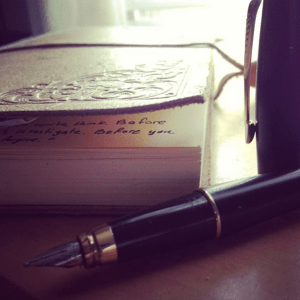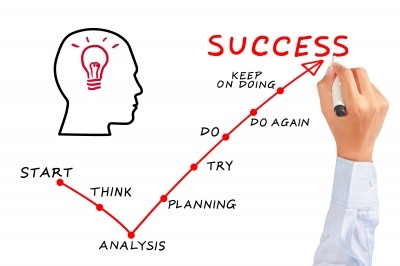Writing and science are two completely different things: left brain and right brain, black and white, Jedi and Sith.
When you think of the writer, you probably imagine a free spirit sitting at a desk with a half empty cup of coffee writing his heart out in the late hours of the night.
Now, when you think of the scientist, you probably see her in a big team working around some fancy machinery and concocting things in flasks.
Woah, two different universes.
Except not really. Behind the scenes, the process that led the writer to writing and the scientist to experimenting is pretty much identical; two variations of the same idea.
The scientific method is the literary method and vice versa. Pretty cool, right?
Despite the whole creative, impulsive perception of writing, you can’t produce effective content just by sitting down with pen and paper or computer and going for it.
You actually have to plan things out step by step, just like with an experiment. I know, it sounds kind of bothersome, but it makes the difference between good writing and outstanding writing.
So what’s this literary process?
It’ll seem familiar if you remember your 5th grade science class.
Table of Contents
1. Observation
Something you read or hear or observe catches your attention and sparks a desire to produce your own input on the matter.
It could be something in the news or an idea in a blog post or a movie or a personal experience or anything, really. Mental stimuli come in all forms.
-
Knowledge and education is power. That’s why collecting knowledge on a topic is crucial.
2. Research
Now that you know what your subject is, you’re going to need to brush up on some facts so that you’re armed with appropriate information.
If you were inspired by a movie, you might want to check out some critic reviews and see what people are saying about it.
If it’s something you learned in a blog post, you might want to find out what other bloggers are saying on the subject.You definitely can’t shun this step.
Readers like facts because facts are concrete information that corroborate your opinion and make you an authority.
Always do your research.
3. Hypothesis
This is a little different from the scientific definition since you’re not predicting something per se.
In this step, rather, your setting your goals for your writing by asking yourself these questions:
> What’s the point of your writing?
> What point of view are you establishing?
> Most importantly, what do you want your reader to do/feel/think?
Just like proving the hypothesis is the point of a scientific experiment, your goals are the point of your work of writing. Yay connections!
Don’t rush into it. Sit, think, and plan things out. Be pensive.
4. Planning
So far, you know what you want to write about, but you’re not sure how exactly you’re going to do it. You lack an organized plan.
Sure, you could start writing what comes to mind, but you’ll likely end up producing a very convoluted, disorganized piece of work.
That’s why planning is crucial.
I can’t remember a time when my teachers in school didn’t make me outline my thoughts before writing them down. Microsoft Word and Apple’s Pages have tools for creating those nifty outlines with the roman numerals and numbers; though, you can go rogue and come up with your own outline style.
The important thing is that you actually do it.
Bonus Tip #1
I learned an interesting tip from my 12th grade history teacher: always reference your point throughout your work.
For example, my teacher asked us to write an essay on why American Reconstruction failed. In each paragraph of my essay, I’d lay out some facts, do some comparisons, and write a brief sentence or two at the end that explained how the facts support the main idea (point) of the essay.
It’s as simple as that and it prevents your leader from getting lost along the way.
Bonus Tip #2
If you want your reader to take some sort of action (like clicking a link or commenting), then you really need to plan your words of influence.
I learned from one of David Wood’s articles that the way you write something and how often you write does matter!
For example, if you want your readers to click on something in a blog post, then you have to strategically place the link three times throughout the post in a way that makes sense.
Apparently it takes us three times of being told to do something before we do it. Man, the human mind is a mystery!
David’s article is marketing focused, but the information is definitely universal, so check it out here if it serves your goals:
Adverbial Clauses – How To Use Indirect Suggestion Patterns To Create More Influence and Sales…
Bonus Tip #3
Formal writing, like articles takes a good deal of concentration because you want to convey your authority on the subject.
Here’s a really valuable post right here from NoPassiveIncome that shows you how to write an effective, professional article if that’s your wish:
How to Write an Article – Writing Tips from a Professional Writer
Write. Woooooo! You’re finally ready to write!
All you need is your trusty outline by your side along with these helpful yet optional resources:
> A dictionary. We all forget that one, perfect word that we desperately need.
> A thesaurus. Redundancy and repetition are bland, but a thesaurus can remedy those ailments.
> Grammar resources. My high school teachers revered the Perdue OWL, and it certainly served me well whenever I felt unsure about my grammar.
Revisions Revisions Revisions
Your first draft will have mistakes. So will your second and third and fourth draft. It’s inevitable.
You need to revise multiple times before your final product perfectly fulfills the goals you set in step 3. Einstein once said “Make everything as simple as possible, but not simpler.”
This principle is the cornerstone of writing that really speaks to its readers. You want to be clear and concise so that your readers can sail through your words without stumbling or scratching their heads.
As you peruse each sentence in your text, ask yourself this: “Are there any words here that don’t contribute to the meaning?” If your answer is yes, get those words out of there.
There you have it. A method you thought you’d never remember after high school (unless you’re a scientist) proved to be just as useful for producing awesome, effective writing.
Now the next step: getting eyes on your literary creations. If you put your content out there on the web, check out this article from NoPassiveIncome that tells you how to increase traffic to your content:
How to Increase Traffic to Your Website : 11 New and Old Effective Tips
Over to you, now. Did you find this post helpful? Do you have any tips or tricks of your own that you’d care to share? I would absolutely appreciate it if you shared your thoughts in a comment below.
May the force be with you!

























Hi Kalina !
All the points that you’ve mentioned are awesome . Its always important to rec-check our posts 2-3 times or even more than that before publishing it to the world ..as many mistakes can be avoided (which includes grammatical mistakes , spelling mistakes ..etc) . Thanks for sharing the information.
-Pramod
Hello Pramod!
Thank you for sharing your thoughts. I am immensely grateful for the opportunity to guest write for your blog, so the honor is truly mine.
Editing is crucial! I’m currently in a writing seminar class here in college, and one assignment is a series of drafts that build up to a final piece. Quite a lot of rechecking involved, but it’s certainly helpful and the best thing you can do to improve your writing.
I wish you a wonderful day!
Hi Kalina,
You have listed some nice points here, Research and planning are two most important things to look before writing a guide.
I agree with Pramod that proofreading a post is a good habit.
Thanks for sharing this effective writing guide.
Hello Tarun,
Thank you for taking the time to leave your thoughts. Research is crucial because it allows you to appeal to ethos and logos, and you can’t go without those in an informative piece!
Proofreading your own work is essential, but what’s even more helpful is having a few other people look over your writing as well because often we don’t catch our little mistakes, despite much proofreading. My English teacher last year gave me an interesting tip: edit your writing by starting with the last sentence and going with the first. That makes it unfamiliar.
I’m glad you enjoyed the post! I hope you have a wonderful day.
~ Kalina
I am so impressed by the thorough explanation of the writing process. Actually the left and the right hemispheres work together to create a strong message.
Starting with intention, then outline – it is all logical. Then dressing it up with emotions and feelings in order to provoke action. Then again, checking, checking.
Kalina, thank you for this powerful post.
Thank you for your comment, Margarita! I am so glad you enjoyed this post. I agree with you that the left and right hemispheres work as one, but the problem is that we focus so much on the actual writing that logic and planning goes out the window. This post is just a reminder that we need to slow down and think before writing or doing anything, really.
Have a wonderful rest of your week!
~Kalina
great tips…so attracting…
actually i always finds how to keep visitors bound to my article but your tips are very beneficial for me..moreover, the bonus points are awesome ..
thanks for sharing
Hello Nitin!
I am so glad that you liked my post! It’s interesting how the manner in which I write about these points demonstrates the extent to which they’re present in my own writing.
Ah, the bonus points are certainly helpful, and they’re subtle little things that we can easily let slip. Basically we have to write with the mindset of the reader in order to truly gauge the effectiveness of our words.
I really appreciate your comment, and I hope this information serves you well. Please feel free to share how you keep your visitors engaged! I’d love to learn.
Have a wonderful Sunday
~Kalina
definitely yar, i am following all these tips ..and i’ll be greatful to share my expereince with you all..
HI Kalina,
such a great article. I really focus on checking out my contents before release them to my viewers. I think this the important thing, not only to guarantee the quality of ít, also to show your respect to your viewers.
Thanks for your valuable information..
Stephan
Hello Stephan!
Thank you for your kind words! I’m glad this information could benefit you. Respect is definitely a key part of it, for a reader would be a bit perturbed if he encountered a grammar error in every other sentence. By revising, you’re showing your readers you truly care about feeding them vital knowledge packaged in an easily digestible manner.
Have a wonderful rest of your week, and thanks for sharing your thoughts!
~Kalina
Great post and exactly what I needed!
I’m perplexed as to why you leave out Blogger as blog app, being owned by Google gives it an edge up when it comes to search.
Hello Lalitha!
I’m very glad you enjoyed this information. I wrote it with the complete intention of providing some insight and inspiration to fellow writers.
I have no experience with Blogger, so I cannot provide an opinion on it; though, I would imagine it’s quite useful considering it’s on Google’s domain. What is your experience with it?
Have a wonderful week!
Kalina
Thank you, Erik! I am so grateful to have had the opportunity to post here on your exceptional blog. It’s a collaborative effort to provide readers with extremely helpful information, and I am glad to be a part of it. I’ve had my fair share of reading here, and I’ve learned an incredible amount of vital tips and tricks from fellow authors.
May you have a lovely rest of the week!
~Kalina
Hi Kalina,
I won’t really say that writing and science are two completely different things. In fact, I would say writing is an art as well as a science.
Why science? For example, in copywriting, there is a formula that can be followed to increase conversion rate.
Why art? Because you really need to learn how to get into the mind of your audience. And you need to know how to market to them. Marketing itself is an art.
Anyway, I want to say thanks for sharing these tips. I have learned a few things that I can apply to my next article. At the end of the day, it does take time to become good at both the artistic and scientific aspects of writing
Hello Lubano,
That is a very interesting perspective and one that makes great sense. I would connect science and writing in the strict, immutable rules that exist in both. Writing has standards for grammar while science provides known facts and methods.
As for art, it takes a creative mind to design an efficient experiment and a creative mind to produce beautiful writing. I really appreciate your interpretation of writing as a craft in which you aim to understand your audience.
I’m glad you could take away something from this post! Please share any tips of your own that you feel are relevant and uniquely beneficial.
To your successful writing,
Kalina
“Hi
You article makes sense. Nice tips to follow. For writing research is very important. one should have complete knowledge about the topic because a little knowledge is dangerous thing. I will definitely try your tips . Thanks
Hello Devesh,
I’m very glad my tips were helpful! They are a culmination of my high school writing experience, and I had some very excellent English teachers who really focused on organization and authority. Good luck in your own writing, and thank you for taking the time to leave your thoughts here!
Kalina
This is very sound and simple advice. Just following all of these points can make a difference between being a good writer and an outstanding writer.
Greetings Denis!
Indeed! Writing professionally can be done easily but learning a few simple rules of thumb, which I have attempted to present here clearly. Once you can follow a certain structure, you can add your own personality to it and create your own voice. Writing well is an essential skill that anyone can take up! Thank you for leaving your thoughts, and may you have a great week.
Kalina
Yes. Writing is an art. It needs careful planning and research before putting it into paper
Kalina, it takes a creative mind to design an efficient experiment and a creative mind to produce beautiful writing. I really appreciate your interpretation of writing as a craft in which you aim to understand your audience.
This is wonderful that you have shared this, God bless!
Great post and it’s exactly what I needed!
I’m perplexed as to why you leave out Blogger as blog app, being owned by Google gives it an edge up when it comes to search.
Thanks for sharing Kalina. 🙂